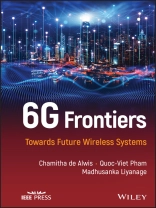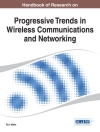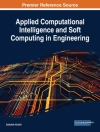6G Frontiers
Enables readers to understand the exciting new technologies, architectural directions, technical aspects, and applications of 6G, plus legal and standardization approaches
6G Frontiers offers intelligent insight into the ongoing research trends, use cases, and key developmental technologies powering the upcoming 6G framework. The authors cover a myriad of important topics that intersect with 6G, such as hyper-intelligent networking, security, privacy, and trust, harmonized mobile networks, legal views, and standards initiatives. The work also explores the more extreme and controversial predictions surrounding 6G, such as hyper-connected smart cities, space tourism, and deep-sea tourism. Sample thought-provoking topics covered in the comprehensive work include:
* Evolution of mobile networks, from 0G to 6G, including the driving trends, requirements, and key enabling technologies of each generation
* Logistics of 6G networks, which are expected to offer peak data rates over 1 Tbps, imperceptible end-to-end delays (beneath 0.1 ms), and network availability and reliability rates beyond 99.99999%
* New technology requirements for 6G, such as Further enhanced Mobile Broadband (Fe MBB), ultra-massive Machine-Type Communication (um MTC), Mobile Broad Band and Low-Latency (MBBLL), and massive Low-Latency Machine Type communication (m LLMT)
* Potential architectural directions of 6G, including zero-touch network and service management, intent-based networking, edge AI, intelligent network softwarization, and radio access networks
A complete and modern resource for understanding the potential development, logistics, and implications of 6G networks, 6G Frontiers is a must-read reference for researchers, academics, and technology architects who wish to understand the cutting-edge progress that is being made towards better and faster wireless mobile technology.
O autorze
Chamitha de Alwis received his Ph.D. degree in Electronic Engineering from the University of Surrey, Guildford, UK, in 2014. He also works as a Consultant in the areas of telecommunication, 4G, 5G, Io T, and network security and is a senior member of the IEEE.
Quoc-Viet Pham received his MS. and Ph.D. degrees in telecommunications engineering from Inje University, South Korea, in 2015 and 2017, respectively. He is a member of the IEEE and is currently Guest Editor of the IEEE Internet of Things Journal.
Madhusanka Liyanage received his M.Eng. degree from the Asian Institute of Technology, Bangkok, Thailand, in 2011, his M.Sc. degree from the University of Nice Sophia Antipolis, Nice, France, in 2011, and his Doctor of Technology degree in communication engineering from the University of Oulu, Finland, in 2016. He is a senior member of the IEEE.












